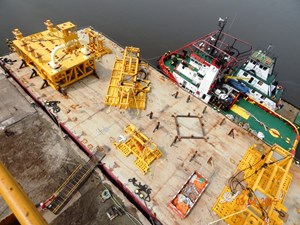Nigeria's economic growth slows after oil sector loss
LAGOS (Bloomberg) -- Nigeria’s economic growth slowed in the first quarter after the oil sector, the country’s biggest foreign-exchange earner, contracted.
Gross domestic product in Africa’s largest oil producer expanded by 2.01% in the three months through March from a year earlier, the Abuja-based National Bureau of Statistics said in a report published on its website Monday. That compares with 2.4% expansion in the fourth quarter. The median estimate of five economists surveyed by Bloomberg was for growth of 2.6%.
Key Insights
The slowdown in growth could increase pressure on the Nigerian Central Bank to cut interest rates further when its announces it policy decision on Tuesday. The Monetary Policy Committee unexpectedly reduced the key rate in March to help boost expansion. Economic growth slowed after the oil sector contracted 2.4% from a year earlier. The crude industry has declined every quarter since the three months through June 2018. The economy is recovering from the 2014 crash in crude prices and the International Monetary Fund forecasts that growth will accelerate to 2.1% this year from 1.9% in 2018. That would still leave it as one of Africa’s least buoyant economies and will be below the rate of population growth, which is almost 3%.
What Bloomberg’s Economist Says
“The first-quarter reading probably represents a temporary slowdown after a strong fourth quarter. As a result, we will be raising our growth forecasts for the remaining quarters of this year. Still, the first-quarter reading may still lead Bloomberg Economics to reduce its 2.5% forecast for economic growth in 2019 as a whole, albeit to above the 1.9% rate achieved in 2018.”
-- Mark Bohlund, economist



